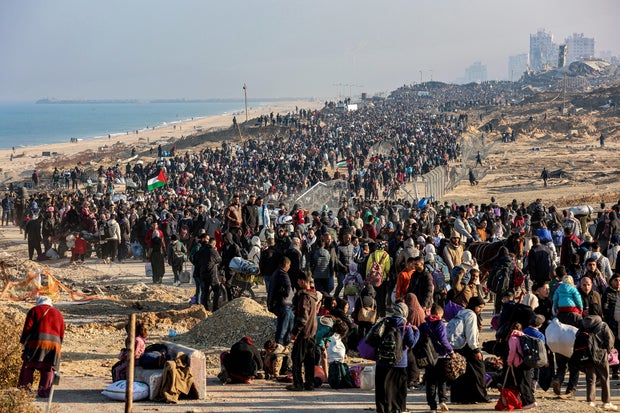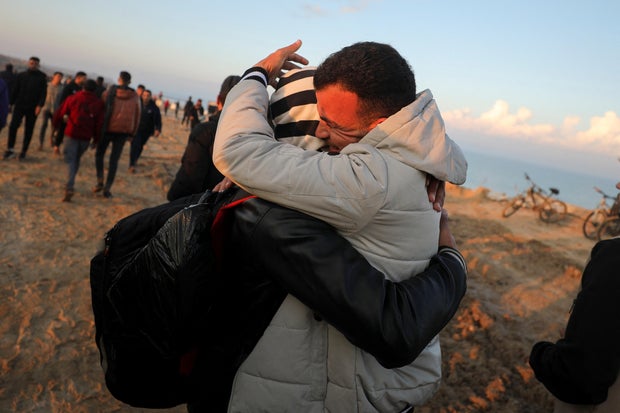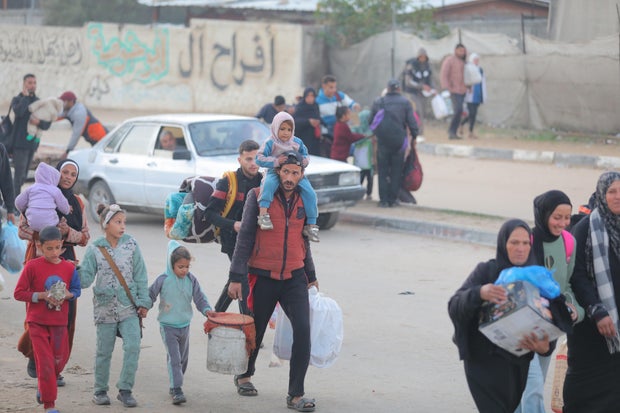Israel on Monday began allowing thousands of Palestinians to return to the heavily devastated northern Gaza Strip for the first time since the early weeks of the 15 month war with Hamasaccording to s fragile pause.
The opening was delayed for two days over a dispute between Hamas and Israel, which said the militant group had changed the order of the guards it had released in exchange for hundreds of Palestinian prisoners. The mediators resolved the dispute overnight.
OMAR AL-QATTAA/AFP via Getty Images
Separately, Israeli forces in southern Lebanon on Sunday he opened fire on protesters demanding they withdraw in accordance with a ceasefire agreement, killing at least 22 and injuring 124, Lebanese health officials said.
Hours later, the White House said Israel and Lebanon had agreed to extend the deadline for Israeli troops to leave southern Lebanon until February 18, after Israel requested more time to withdraw beyond the 60-day deadline specified in the cease-fire agreement that ended the Israel-Hezbollah War at the end of November.
Israel has said it will have to stay longer because the Lebanese army has not been sent to all areas of southern Lebanon to ensure that Hezbollah does not re-establish its presence in the area. The Lebanese army has said it cannot send it in until the Israeli forces pull out.
Palestinians who have been sheltering in squalid tent camps and school-turned-shelters for more than a year are desperate to return to their homes – even knowing they are likely to have been vandalized or destroyed . Many feared that Israel would make the exodus permanent, and they raised similar concerns about an idea floated by President Trump to resettle large numbers of Palestinians in Egypt and Jordan.
Ismail Abu Matter, a father of four who had waited three days before crossing with his family, described scenes of joy on the other side, with people singing, praying and crying as they came together again with relatives.
Dawoud Abu Alkas/REUTERS
“It's the joy of returning,” said Abu Matter, whose family was among the hundreds of thousands of Palestinians who fled or were expelled from what is now Israel during the war in 1948 around its creation. “We thought we wouldn't come back, like our ancestors.”
Hamas called the return “a victory for our people, and proof of failure and defeat for (Israel's) possession and transfer plans.”
The ceasefire aims to end the deadliest and most destructive war ever fought between Israel and Hamas and ensure the release of dozens of hostages caught in Attack of the militants October 7, 2023which provoked the fight.
Israel ordered a large-scale evacuation from the north in the opening days of the war and sealed it shortly after ground troops moved in. Around a million people fled to the south in October 2023, while hundreds of thousands remained in the north, which saw some of the heaviest fighting and worst destruction of the war.
Hassan Jedi/Anadolu via Getty Images
Israeli Defense Minister Katz said Israel would continue to enforce the ceasefire and that anyone who violates it or threatens Israeli forces “will bear the full cost.”
“We will not allow ourselves to return to the reality of October 7,” he wrote on the X platform.
Israel had delayed the opening of the crossing, which was supposed to take place over the weekend, saying it would not allow Palestinians north until a female civilian host , Arbel Yehud, was released. He also accused Hamas of not providing information on whether the remaining guards who were to be freed in the first instance are alive or dead.
Hamas then accused Israel of breaking the agreement by not opening the crossing.
The Gulf nation of Qatar, a key mediator with Hamas, announced early Monday that an agreement had been reached to release Yehud along with two other hostages by Friday.
Israeli Prime Minister Benjamin Netanyahu said in a statement that they will be released – which will include female soldier Agam Berger – on Thursday. That release will be in addition to the one already set for next Saturday, when three hosts should be released.
Hamas also provided a list of the required information about the guards who were to be released during the first phase of the six-week ceasefire.
Starting at 7 a.m., Palestinians were allowed to cross on foot uninspected through part of the so-called Netzarim corridor, a military zone crossing the territoryjust south of Gaza City that Israel carved out early in the war. . A vehicle checkpoint was to open later with a screening device, details of which were not immediately available.
Under the first phase of the ceasefire, which runs until early March, Hamas is to free a total of 33 hostages in exchange for the release of nearly 2,000 Palestinians imprisoned by Israel if spread. The terrorists have released seven hostages, including four female soldiers early Saturdayin the current ceasefire, in exchange for more than 300 prisoners, including many serving life sentences for deadly attacks on Israelis.
The second – and much more difficult – phase of the agreement has not yet been negotiated. Hamas says it will not release the 60 or so remaining hostages unless Israel ends the war, and Netanyahu says he remains committed to destroying the militant group and ending his nearly 18-year rule over Gaza.
Hamas started the war when thousands of its fighters entered southern Israel on October 7, 2023, killing around 1,200 people, mostly civilians, and abducting another 250.
Israel's air and ground war has killed more than 47,000 Palestinians, more than half of them women and children, according to the Hamas-run Gaza Health Ministry. It does not say how many of the dead were combatants. Israel claims to have killed more than 17,000 militants, without providing evidence.
Israeli bombing and ground operations have displaced an estimated 90% of Gaza's 2.3 million people, often multiple times, and leveled entire neighborhoods.








